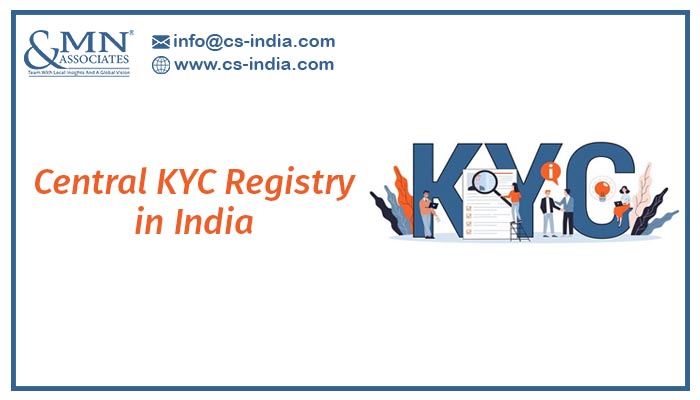
Central KYC Registry in India
Central KYC (“CKYC”) Record Registry Record Registry receive, store, safeguard and retrieve the KYC details of the client as per Section 2(1) (ha) of Prevention of Money Laundering Act, 2002. CKYC is a centralized repository for maintaining and keeping the records of customer KYC records to reduce the hassle of providing documents again & again and verify them each & every time.
CKYC is authorized by the Central Registry of Securitization Asset Reconstruction and Security Interest of India (“CERSAI”) to set and establish under Section 20(1) of Securitization and Reconstruction of Financial Assets and Enforcement of Security Interest Act, 2002 (“SARFAESI Act”).
Some of the salient features of the CKYC are as follows:
- It facilitates KYC records & processes across the financial sector such as Banks, Financial Institutions, etc.
- It has a Unique KYC identifier linked with independent ID proofs.
- It substantially reduces the cost by avoiding multiple times of registration.
- It stores KYC data and documents in a digitally secure electronic format.
- It facilitates KYC search, upload, download, and update.
- It reduces data duplication to ensure a single KYC identifier issue per applicant.
- It ensures real-time notification to institutions upon updation in KYC details of the applicant.
- It facilitates seamless file exchange to, from and within the portal.
- Secured & advanced user authentication mechanism for system access.
Functions & Obligations of CKYC
- A reporting entity can access customer’s information through the online connectivity with CKYC Registry.
- CKYC Registry maintains a secure data transmission link with the reporting entity to which the ID is issued.
- CKYC Registry informed the reporting entity to update the customer’s details.
- To access the customer’s information, the reporting entity has to make payment in advance for the service of CKYC
- CKYC Registry issues a unique KYC Identifier for each client.
- Electronic data is maintained and accessible to all material information every time to the reporting entity.
- CKYC Registry should take precautionary action to ensure that electronic CKYC records are not lost, destroyed or tempered.
- CKYC Registry makes sure that sufficient backup is taken care of at different systems and places.
- Take all reasonable measures to prevent unauthorized access to records.
The features of KYC Identifier are as follows:
- A 14 digit unique KYC identifier will be generated for new customer records and notified to the reporting entity.
- For Small Account the KYC identifier will additionally have a prefix “S”.
- For Simplified Measures Account the KYC identifier will additionally have a prefix “L”.
Reporting Entity
Any Financial Institutions such as bank registered with Reserve Bank of India, Merchant Bankers, Depository Participants, etc. registered with Securities Exchange Board of India, Insurance companies regulated by Insurance Regulatory and Development Authority or pension regulated by Pension Fund Regulatory and Development Authority can approach to CKYC to get registered as Reporting Entity.
Functions & obligation of Reporting Entity
- A reporting entity shall be required to register with CKYC Registry.
- A reporting entity shall verify the identity of the customer & perform the due diligence.
- If the KYC Identifier is provided then download the KYC documents from CKYC Registry.
- A reporting entity shall not use or transfer the KYC record and any information to the third party unless authorized by the customer.
- A reporting entity will be responsible for verifying the authenticity of the identity of the customer.
Procedure for Registration under CKYC :
- Every reporting entity has to register itself on the CKYC Registry portal with 2 primary users who in turn can create more users through http://www.ckycindia.in.
- Fill the requisite details on the registration screen by Nodal Officer/Authorized Signatory of the reporting entity.
- Upon submission, reference ID will be generated & sent on the registered email address of the Nodal Officer/Authorized Signatory.
- Duly signed form along with the following documents shall be sent to CKYC Registry areas:
- Reporting Entity License/Certificate/Notification
- Pan Card of the entity
- CIN of the entity
- Registration Certificate in case of Co-operative Banks/societies
- Authorization letter by competent authority for the admin user
- Certified copy of photo identity card of the admin user issued by an entity
- Certified copy of the proof of the identity of the admin users
- After successful registration, the user credential will be emailed to admin and co-admin users.
CKYC Registry helps and maintains the KYC records of the entire customer at one place which reduces the time and cost of the customer to submit KYC documents every time when they approached any financial institution. CKYC Registry also updates the date of the customer which is being provided by him/her to the reporting entity and the reporting entity makes sure that changes are updated within the time.
For any assistance reach us at info@cs-india.com
